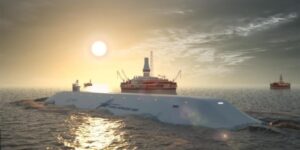Russia has begun planning nuclear-powered submarines to export liquefied natural gas (LNG) from the Arctic to Asia in a bid to cut journey time through the Northern Sea Route (NSR), a senior state official said.
Russia already uses nuclear-powered icebreakers capable of breaking Arctic ice to pave the way for such shipments via the Northern Sea Route , which runs along Russia’s Arctic coast from Murmansk in the west to the Bering Strait in the east, a route Moscow sees as a faster alternative to the Suez Canal and plans to develop.
But Russia suffers from a shortage of ships capable of breaking through the thick Arctic ice, which is an obstacle to the new Arctic LNG 2 project that is subject to sanctions by the United States because of the war in Ukraine.
The Arctic LNG 2 plant began producing the sea-borne LNG last December. But although the first shipments of the super-cooled gas were sent in early August, it has not yet been transferred to end buyers.
Mikhail Kovalchuk, a close associate of President Vladimir Putin and director of the Kurchatov Institute, a pioneering nuclear research center, presented the project at an industrial conference in St. Petersburg last week, according to the event’s official website.
“This is the creation of a fundamentally new class of ships, capable of being an alternative to ‘traditional’ gas carriers, which in Arctic conditions are not able to sail year-round without an escort of icebreakers,” the Offshore Marintec Russia 2024 website said.
The website quotes Kovalchuk who had talks in the Kremlin with Putin on September 24 and told the conference: “The construction of submarine nuclear-powered gas carriers has been discussed for a long time, since the early 2000s. Now we (the Kurchatov Institute) and Gazprom have started planning one, and this project will go ahead.”
Media outlet RBC reports that the idea consists of reducing the time required for navigation from 20 to 12 days as well as that the submarines would be able to carry about 180,000 tonnes of LNG, in line with a conventional Arc 7 ice-class gas carrier.
The planned submarines will be 360 meters long and no more than 70 meters wide, and will be powered by RITM-200 nuclear reactors, which Russia uses to power its newest icebreakers.
Some experts are, however, skeptical about the feasibility of the submarine project.
Alexander Nikitin, a former Russian Navy officer who is a nuclear expert at the Vilnius-based Bellona Environmental Transparency Center, said Russia does not have the capabilities to build such a submarine.
And it would also need additional service vessels and docks as well as crews with special training, he said.
“My guess is that people are thinking and saying ‘maybe it will work.’ But given the situation, it’s unlikely,” he said, calling the plan a “bluff.”
Ask me anything
Explore related questions





